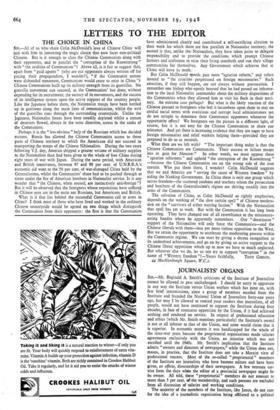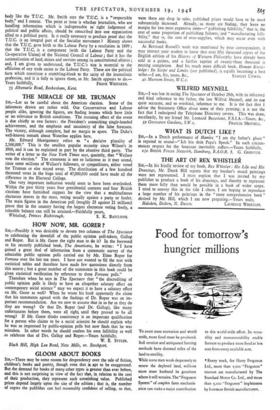JOURNALISTS' ORGANS
SIR,—Mr. Reginald A. Smith's criticisms of the Institute of Journalists cannot be allowed to pass unchallenged. I should be sorry to aggravate in any way the Institute versus Union warfare which has gone on, with few brief intermissions, since a group of members seceded from the Institute and founded the National Union of Journalists forty-one years ago, but may I be allowed to remind your readers that journalists, of all people, would not have continued to support the Institute during four decades, in face of strenuous opposition by the Union, if it had achieved nothing and rendered no service. In respect of professional education and ethics (which Mr. Smith mentions particularly) the Institute's record is not at all inferior to that of the Union, and some would claim that it is superior. In economic matters it was handicapped for the whole of the inter-war years because the proprietorial organisations made salaries agreements exclusively with the Union, an injustice which was not rectified until the 1940s. Mr. Smith's implication that the Institute admits " owners and directors of newspapers," while the Union does not, means, in practice, that the Institute does not take a Marxist view of professional success. Most of the so-called " proprietorial" members of the Institute are journalists who have become editors and have been given, ex officio, directorships of their newspapers. A few veterans sur- vive from the days when the editor of a provincial newspaper might be its owner. All told, these " proprietorial " members do not amount to more than 5 per cent. of the membership, and such persons are excluded from all discussion of salaries and working conditions.
The majority of the members of the Institute, like Janus, do not care for the idea of a journalistic organisation being affiliated to a political
body like the T.U.C. Mr. Smith says the T.U.C. is a "respectable body," and I concur. The point at issue is whether journalists, who are handling information which is indispensable to right judgement of political and public affairs, should be conscribed into one organisation allied to a political party. Is it really necessary to produce proof that the T.U.C. is an integral part of the Socialist movement ? History shows that the T.U.C. gave birth to the Labour Party by a resolution in 1899 ; that the T.U.C. is a component (with the Labour Party and the Co-operative Union) of the National Council of Labour ; that it has the nationalisation of land, mines and services among its constitutional objects ; and, I am given to understand, the T.U.C.'s visa is essential to the affiliation of any trade union to the Labour Party. These are the political facts which constitute a stumbling-block to the unity of the journalistic profession, and it is folly to ignore them, as Mr. Smith appears to do.— Yours faithfully, FRANK WHITAKER. 73 Albemarle Road, Beckenham, Kent.



































 Previous page
Previous page